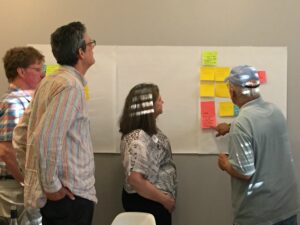 This blog was written by our community partner Michael Walther of Oak Wealth Advisors. As experts in special needs planning, the people at Oak Wealth Advisors can provide your family with the support you need to put your future in order.
This blog was written by our community partner Michael Walther of Oak Wealth Advisors. As experts in special needs planning, the people at Oak Wealth Advisors can provide your family with the support you need to put your future in order.
Families of loved ones with special needs face greater challenges with future planning than other families do. In Oak Wealth Advisors’ experience working with families of loved ones with special needs, we have been able to identify a number of traits that separate those who are more successful than the others.
5 Keys To Future Planning Success
Families who have been the most successful with their future planning have the following things in common:
1. They are always working on their planning. It is a journey, not an event. Planning must be an ongoing active process.
Know Your Network
 2. They have fiduciary advisors assisting them. Fiduciary advisors are required by law to put their clients’ interests ahead of their own. Insurance agents, stock brokers and others who may call themselves financial advisors, but who will not put their status as a fiduciary advisor in writing, should be approached with caution. These non-fiduciaries get compensated for selling products like insurance policies and annuities and have conflicts of interest that will likely harm your planning.
2. They have fiduciary advisors assisting them. Fiduciary advisors are required by law to put their clients’ interests ahead of their own. Insurance agents, stock brokers and others who may call themselves financial advisors, but who will not put their status as a fiduciary advisor in writing, should be approached with caution. These non-fiduciaries get compensated for selling products like insurance policies and annuities and have conflicts of interest that will likely harm your planning.
3. Successful families cast a wide net. Having a trusted network and being actively engaged in the special needs community allows them to learn of opportunities before others. It also enables them to find answers to new issues more easily when they arise.
Documentation and Communication
4. They document their planning. Estate planning documents such as wills, trusts, and powers of attorney are essential written documents. Care guides and letters of intent are not legal documents but are nonetheless also valuable documents due to the information they contain.
 5. They communicate their future planning. There are two benefits to letting other family members know what planning is in place and what is contemplated for the future. This allows people to learn that they have been named to serve in some capacity in the future. This allows them to ask questions and understand what is expected and also to decline to serve if they do not believe they will be able to meet the expectations of the family.
5. They communicate their future planning. There are two benefits to letting other family members know what planning is in place and what is contemplated for the future. This allows people to learn that they have been named to serve in some capacity in the future. This allows them to ask questions and understand what is expected and also to decline to serve if they do not believe they will be able to meet the expectations of the family.
 By learning that a future member of the planning team for a loved one is not interested in the role, the family has time to identify and implement other people for the needed roles. Communication also avoids unexpected generosity that negatively impacts the planning that is done. In summary, the more your extended family knows, the smoother the implementation of your planning will be.
By learning that a future member of the planning team for a loved one is not interested in the role, the family has time to identify and implement other people for the needed roles. Communication also avoids unexpected generosity that negatively impacts the planning that is done. In summary, the more your extended family knows, the smoother the implementation of your planning will be.
Tools For Success
As you likely noticed, these actions have no financial cost, but they do require timing and thought. We hope all families will focus on these things to improve their long-term planning success.
Check out past blogs from Michael Walther on planning for the future and school year tips for success.
